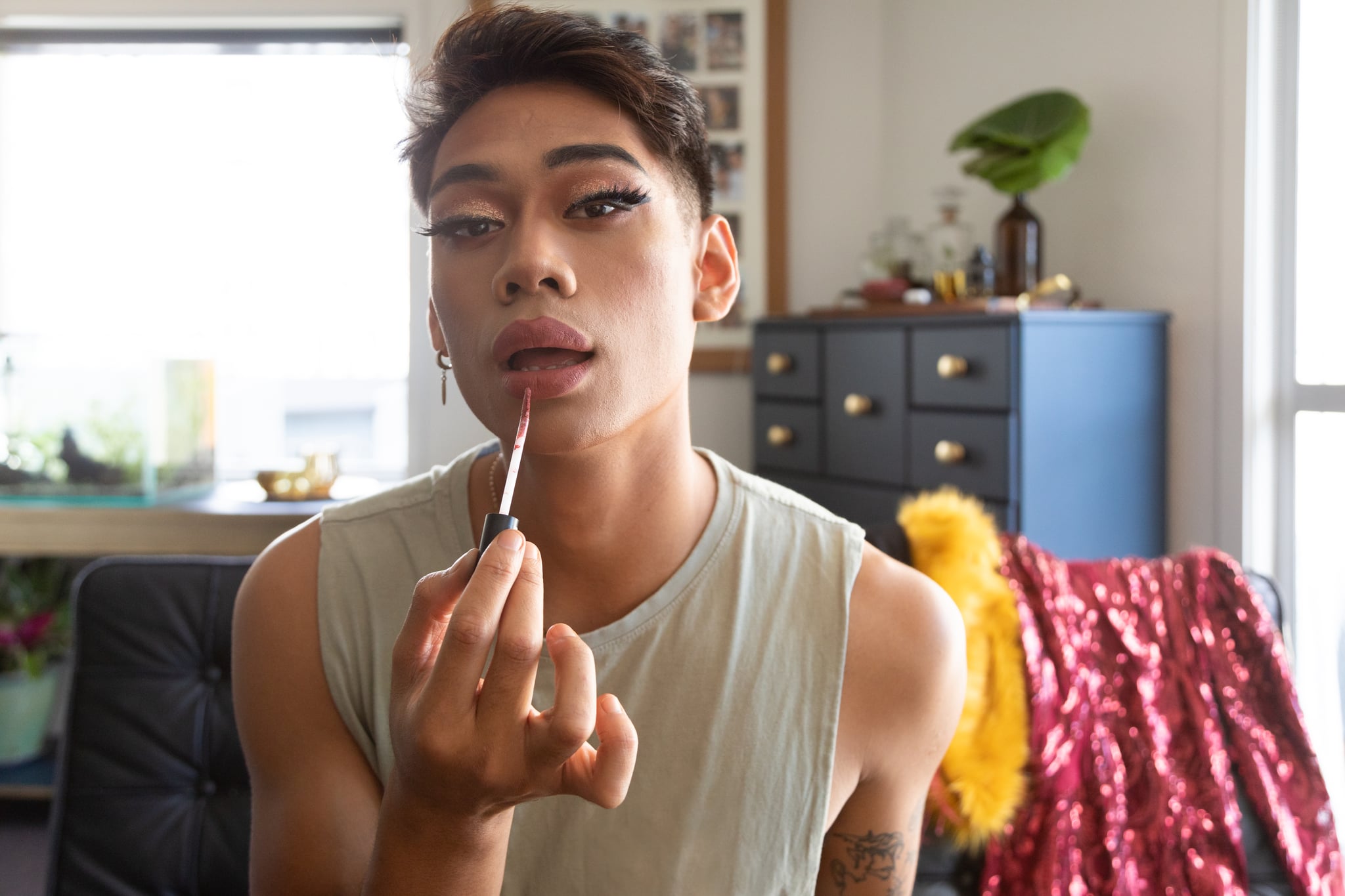How Beauty Vlogs Became the Shy Queer Guy's Introduction to Makeup

“Stop fidgeting or it’ll smudge,” my boyfriend Raphael commands. Ahead of brunch, he’s doing my makeup for the first time. Sleep evaded me last night, and because I was not born with it, our friends at Maybelline have come to the rescue.
Cosmetics have long helped women find confidence, and they’re now doing the same for more and more men and male-presenting people, especially in the LGBTQ+ community. Men wearing makeup is nothing new, of course, but the movement first became more mainstream in 2014 and 2015, with brands like Clinique and Tom Ford dropping concealers and foundations for men and influencers like James Charles and Manny Gutierrez landing lucrative beauty deals with Covergirl and Maybelline, respectively. Cut to today and the men-in-makeup pack has gone viral with a rainbow-powder-cloud explosion of shyer, perhaps more relatable queer beauty vloggers.
One of them is Memphis-based Delsin DePuy, who started his TikTok channel in 2019 after watching the likes of Patrick Starr and thinking, Oh, I can do this too. Since then, he has amassed 106K followers. He believes sharing makeup tips and tricks gives queer guys — and the breast cancer survivors he works with at a non-profit support group — the courage to experiment with makeup and feel beautiful.
Still, some of Delsin’s own self-confidence has flaked like eyeshadow on a dry lid. “I actually used to be more confident with wearing makeup when I was in high school,” he tells POPSUGAR. “I mean, I would pretty much get into drag before school — lashes and everything. Nowadays I find the attention a bit overwhelming.”
Personally, I get it. This morning, when Raphael started selling me on the idea of a micro-makeover, I was iffy. I didn’t want people gawking. But he was all, “Pretty please, with cherry Chapstick on top,” so here we are — my face dabbed with concealer and color corrector. It’s more of a revival than a full glow-up.
Kaspar Jack, who lives in London, is a big fan of this subtler look. In fact, he created his account because a friend noticed very few male vloggers were focused on easy, natural makeup and suggested he have a go.
Give me all the ☀️ #mensmakeup #makeupformen
Like Delsin, Kaspar disliked the attention that his makeup, although understated, would attract. “At first, I would get comments from friends asking, ‘Are you wearing makeup?’ and I would get a little bit embarrassed by it, but over time, I felt more confident and just stopped caring what others think,” he says. “Now I do all of their makeup.”
Kaspar adds that the role of the queer beauty vlogger is to normalize guys using cosmetics. “In the gay community, we have always done things privately in the past and never shown or expressed ourselves publicly,” he says. “So the more we see people who are like us on social media and on the streets, people who confidently express themselves, the better.”
Reams of positive feedback and 38K followers later, it’s fair to say Kaspar’s efforts are paying off. Some fans are grateful he pushed them to buy and try makeup for the first time, while others are loving the fact he managed to dispel any shame they once felt.
Raphael, now applying his own makeup as I admire my youthful visage, is a big Kaspar Jack stan. Raphael’s journey into the world of bronzer and blusher began just six months ago, and I’m embarrassed to admit that it initially made me laugh then recoil. What was behind such a cruel, visceral response in me to something so inoffensive, so joyful to many?
According to London-based psychotherapist Fergus Evans, “Some folks might dislike the idea of experimenting with makeup because they find it difficult to step outside of a social conditioning, which dictates that makeup is for women and not men. They could be worried about how they — as part of a community with a history of victimization, harassment and violence — may be received in public. They don’t want to make themselves vulnerable with outward signifiers of gender.”
That’s me all right, and it also seems to be Ryan Bailey Potter, a recent transplant to New York, who for years struggled with the inner conflict between his feminine and masculine sides. “From a young age, I always had this urge to express myself more femininely, but that went against everything that was instilled in me from birth,” he says. “The homophobia that I experienced throughout my adolescence has left residual trauma that can make it hard to express myself. It’s a little bit of baggage that a lot of queer guys carry throughout life.”
#stitch with @alexandriiatyler #advicetiktok #positivethoughts
For others, Fergus adds, “wearing makeup might not be an authentic expression of oneself. There’s this inverse pressure on queer men to explore their gender and express gender transgression outwardly, which gives some people freedom but isn’t necessarily helpful for others.”
On the issue of authentic expression, one of Bailey Potter’s points left me wondering if my response to Raphael’s foray into makeup was partly the nasty progeny of internalized homophobia and envy. “Homophobia stems from a place of projection. Seeing people express themselves freely can trigger others who may not feel as comfortable doing the same. If people started tapping into their natural instinct instead of repressing it, we’d see people showing up in the world more genuinely.”
I confess to Raphael that I may have trolled him out of jealousy and he informs me I’ll be paying for brunch. Fair. But we can’t leave the apartment yet. Although my outlook on men wearing makeup has shifted, his setting spray hasn’t dried.
Source: Read Full Article
